七年级英语下册Unit 6教案
- 格式:doc
- 大小:52.00 KB
- 文档页数:7
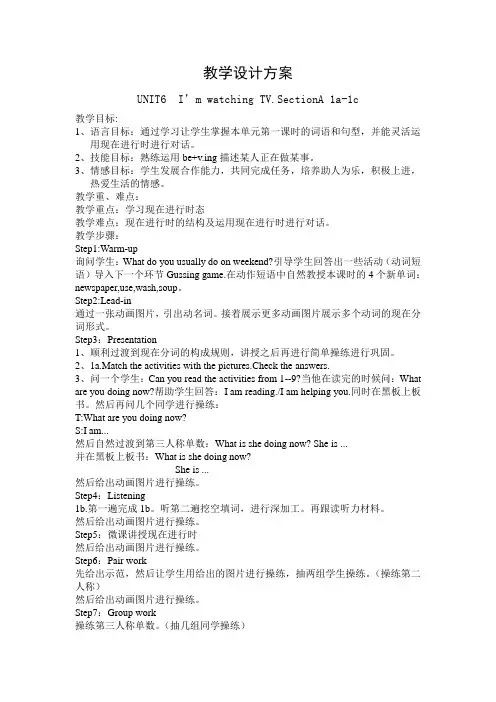
教学设计方案UNIT6 I’m watching TV.SectionA 1a-1c教学目标:1、语言目标:通过学习让学生掌握本单元第一课时的词语和句型,并能灵活运用现在进行时进行对话。
2、技能目标:熟练运用be+v.ing描述某人正在做某事。
3、情感目标:学生发展合作能力,共同完成任务,培养助人为乐,积极上进,热爱生活的情感。
教学重、难点:教学重点:学习现在进行时态教学难点:现在进行时的结构及运用现在进行时进行对话。
教学步骤:Step1:Warm-up询问学生:What do you usually do on weekend?引导学生回答出一些活动(动词短语)导入下一个环节Gussing game.在动作短语中自然教授本课时的4个新单词:newspaper,use,wash,soup。
Step2:Lead-in通过一张动画图片,引出动名词。
接着展示更多动画图片展示多个动词的现在分词形式。
Step3:Presentation1、顺利过渡到现在分词的构成规则,讲授之后再进行简单操练进行巩固。
2、1a.Match the activities with the pictures.Check the answers.3、问一个学生:Can you read the activities from 1--9?当他在读完的时候问:What are you doing now?帮助学生回答:I am reading./I am helping you.同时在黑板上板书。
然后再问几个同学进行操练:T:What are you doing now?S:I am...然后自然过渡到第三人称单数:What is she doing now? She is ...并在黑板上板书:What is she doing now?She is ...然后给出动画图片进行操练。
Step4:Listening1b.第一遍完成1b。
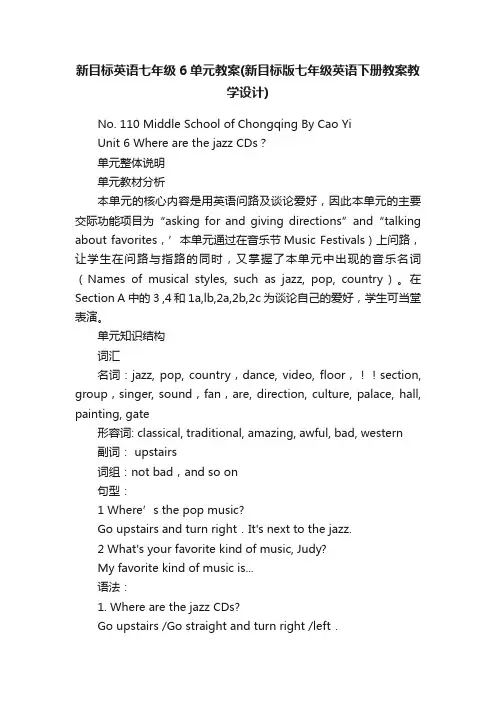
新目标英语七年级6单元教案(新目标版七年级英语下册教案教学设计)No. 110 Middle School of Chongqing By Cao YiUnit 6 Where are the jazz CDs?单元整体说明单元教材分析本单元的核心内容是用英语问路及谈论爱好,因此本单元的主要交际功能项目为“asking for and giving directions”and“talking about favorites,’本单元通过在音乐节Music Festivals)上问路,让学生在问路与指路的同时,又掌握了本单元中出现的音乐名词(Names of musical styles, such as jazz, pop, country)。
在Section A中的3 ,4和1a,lb,2a,2b,2c为谈论自己的爱好,学生可当堂表演。
单元知识结构词汇名词:jazz, pop, country,dance, video, floor,!!section, group,singer, sound,fan,are, direction, culture, palace, hall, painting, gate形容词: classical, traditional, amazing, awful, bad, western副词: upstairs词组:not bad,and so on句型:1 Where’s the pop music?Go upstairs and turn right.It's next to the jazz.2 What's your favorite kind of music, Judy?My favorite kind of music is...语法:1. Where are the jazz CDs?Go upstairs /Go straight and turn right /left.They are between the pop and the country2 The use of the sentences structures.单元整体目标1.Master the vocabulary.2.Master and use:Where are the country CDs?Go upstairs /Go straight and turn right /left.They are between …and …/next to… behind …单元教学重难点一览重点难点I The vocabulary.2 The Grammar. 1 Asking for and giving directions.2 Talking about favorite.单元学情分析本单元与前几个单元的学习自然衔接,继续学习询问和指点方向,而且与学生愿意接触的“音乐“有关,很大程度上能调动学生的学习积极性。
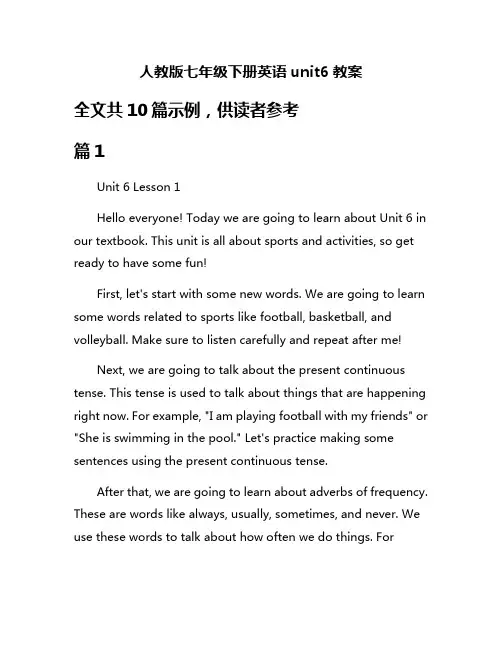
人教版七年级下册英语unit6教案全文共10篇示例,供读者参考篇1Unit 6 Lesson 1Hello everyone! Today we are going to learn about Unit 6 in our textbook. This unit is all about sports and activities, so get ready to have some fun!First, let's start with some new words. We are going to learn some words related to sports like football, basketball, and volleyball. Make sure to listen carefully and repeat after me!Next, we are going to talk about the present continuous tense. This tense is used to talk about things that are happening right now. For example, "I am playing football with my friends" or "She is swimming in the pool." Let's practice making some sentences using the present continuous tense.After that, we are going to learn about adverbs of frequency. These are words like always, usually, sometimes, and never. We use these words to talk about how often we do things. Forexample, "I always go running in the morning" or "She never eats vegetables." Let's practice using these words in sentences.Finally, we are going to do a fun activity where we talk about our favorite sports and activities. You can ask your classmates questions like "Do you like playing basketball?" or "How often do you go swimming?" Remember to use the new words and grammar we have learned today!That's all for today's lesson. I hope you enjoyed learning about sports and activities with me. See you next time!篇2Unit 6: I'm watching TVLesson 11. Learn to talk about television shows2. Practice asking and answering questions about TV shows3. Learn new words related to televisionHi everyone! Today we are going to learn about television shows. Do you like watching TV? What's your favorite show? Let's learn some new words related to television first.New words:- Program: a TV show- Channel: a TV station- News: information about what's happening in the world- Cartoon: animated TV show- Comedy: a funny TV show- Drama: a serious TV showNow let's practice asking and answering questions about TV shows. For example:Q: What's your favorite TV show?A: My favorite TV show is "Friends".Q: What type of TV show do you like?A: I like comedies.Q: What time is your favorite show on?A: It's on at 8:00 pm.Now let's talk about the TV shows we like. I'm sure we all have different preferences, so let's share with each other and learn more about the different shows we enjoy.That's all for today! Keep watching your favorite shows and have fun learning English! See you next time!Lesson 21. Learn to talk about what people are doing2. Practice using the present continuous tense3. Learn new words related to activitiesHello everyone! Today we are going to learn how to talk about what people are doing. Let's learn some new words related to activities first.New words:- Watching: looking at something on TV or in person- Reading: looking at words in a book or on a screen- Playing: doing an activity for fun- Eating: putting food in your mouth- Listening: paying attention to soundsNow let's practice using the present continuous tense to talk about what people are doing. For example:Q: What is Sarah doing?A: She is watching TV.Q: What are you doing right now?A: I am reading a book.Q: What are they doing on the playground?A: They are playing basketball.Now let's talk about what we are doing. You can use the present continuous tense to describe your actions at the moment. Let's have fun practicing and learning together.That's all for today! Keep practicing English and enjoy your favorite activities. See you next time!篇3Unit 6: What time do you go to school?Hello everyone! Today we are going to learn all about time in Unit 6. We will learn how to talk about different times in English and also how to ask and answer questions about time. Let's get started!1. Warm-up:To warm up, we are going to start by practicing telling the time. I will show you a clock and you have to say the time inEnglish. For example, if the clock shows 9:30, you will say "It's nine thirty". Are you ready? Let's begin!2. Vocabulary:Next, we are going to learn some new vocabulary related to time. We will learn words such as morning, afternoon, evening, night, hour, minute, o'clock, etc. Repeat after me and practice saying the new words out loud.3. Grammar:Now, let's talk about how to ask and answer questions about time. We will learn questions like "What time do you get up?" and "What time do you go to bed?". We will also learn how to answer these questions using the correct time. For example, "I get up at seven o'clock" or "I go to bed at ten thirty".4. Listening:For the listening activity, I will play a recording of different people talking about their daily routines. Listen carefully and try to understand what time they do different activities. After the recording, we will discuss the answers together.5. Speaking:In this activity, we will practice asking and answering questions about time. Pair up with a partner and take turns asking each other questions such as "What time do you have breakfast?" and "What time do you do your homework?". Practice speaking in complete sentences and using the correct time.6. Writing:Finally, we will do a writing activity where you have to write about your own daily routine. Write down what time you wake up, eat meals, go to school, do homework, etc. Be sure to use the correct time format and organize your sentences in a clear and logical way.That's all for today's lesson on Unit 6: What time do you go to school? I hope you enjoyed learning about time with me. Remember to practice telling the time and asking questions about time with your friends and family. See you next time! Bye bye!篇4Unit 6 Our Local AreaHello everyone! Today we are going to learn about Unit 6 "Our Local Area" in the seventh grade English textbook. Are you all ready? Let's get started!First, we will learn some new words related to our local area, such as "neighborhood", "busy", "peaceful" and so on. Make sure to remember these words because we will use them a lot in our lesson.Next, we will talk about the different places in our local area, like the park, the library, the hospital, and the supermarket. We will learn how to give directions to these places and also talk about the activities we can do there. For example, we can say "The park is on the left. We can play basketball there."After that, we will learn how to describe our neighborhood using adjectives. Is your neighborhood noisy or quiet? Is it clean or dirty? Tell me about it using words like "crowded", "beautiful", "noisy", and "clean".Finally, we will practice reading, writing, speaking, and listening using the new vocabulary and grammar we have learned. We will have quizzes, games, and group activities to help us remember everything we have studied.I hope you are all excited to learn about our local area today! Let's have fun and improve our English skills together. See you in the next class!篇5Unit 6Hello everyone! Today we are going to learn about Unit 6 in our textbook. This unit is all about vacations and we are going to have so much fun learning about different vacation activities and destinations.Learning Goals:1. To be able to talk about different vacation activities.2. To learn new vocabulary related to vacations.3. To practice speaking and writing about our dream vacations.Warm-up:Let's start by talking about our favorite vacation activities. Raise your hands and share with the class what you like to do on vacation. Do you like to go swimming, hiking, or maybe just relax on the beach?Vocabulary:Now let's learn some new words related to vacations. Let's repeat after me: beach, camping, sightseeing, snorkeling, hiking, souvenir. These words will help us talk about different vacation activities.Listening:Listen to the audio and answer the questions about different vacation destinations. Pay attention to the details and try to understand where the people in the audio are going on vacation.Speaking:Now it's time for some role play! Pair up with a classmate and imagine you are planning a vacation together. Decide on a destination, activities, and what souvenirs you want to buy. Then share your plans with the class.Writing:For our writing activity, I want you to write a short paragraph about your dream vacation. Where would you go? What activities would you do? Who would you go with? Be creative and use the vocabulary we learned today.Class Discussion:Let's end our lesson with a class discussion about our dream vacations. Raise your hand and share with the class where you would like to go on vacation and why. Let's learn from each other's ideas and maybe even get inspired to plan our own dream vacations.Homework:For homework, I want you to write a postcard to a friend, telling them about your dream vacation. Include details about the destination, activities, and souvenirs you would buy. Don't forget to use the vocabulary we learned today!That's all for today's lesson. I hope you enjoyed learning about vacations with me. Have a great day and start dreaming about your next adventure!篇6Unit 6 Animals in dangerHi everyone! Today I'm going to tell you all about Unit 6 in our English textbook. It's all about animals in danger and how we can help them.First, we will learn about different endangered animals like pandas, tigers, and elephants. We will also talk about the reasonswhy these animals are in danger, like hunting and deforestation. It's important for us to understand why these animals need our help.Next, we will learn some vocabulary words related to animals in danger. Words like endangered, extinct, habitat, and conservation. These words will help us understand more about the topic and how we can protect these animals.After that, we will read some stories about people who are helping endangered animals. We will learn about what they are doing to protect these animals and how we can do our part to help too. It's important for all of us to work together to save these animals.In our workbook, we will have some fun activities like matching the animals with their habitats, completing sentences with the correct vocabulary words, and answering questions about the stories we read. These activities will help us review what we learned in class.Finally, we will have a project where we can choose an endangered animal to research and present to the class. We can talk about why this animal is in danger and what we can do to help save it. It's a great way for us to learn more about these animals and how we can make a difference.I hope you all enjoy learning about animals in danger in Unit6. Remember, it's up to us to protect these animals and make sure they have a safe and happy home. Let's work together to save them!篇7Hello everyone! Today I'm going to share with you the lesson plan for Unit 6 in the New Curriculum Grade 7 English textbook.Title: Unit 6 - Sports and HobbiesObjectives:1. To introduce new vocabulary related to sports and hobbies2. To practice speaking and listening skills through discussions about favorite sports and hobbies3. To enhance reading comprehension skills by reading and discussing a text about different sports4. To develop writing skills by writing a short paragraph about personal interests in sports and hobbiesWarm-up:Start the lesson by asking the students what sports or hobbies they enjoy doing. This will help generate interest in the topic and also provide a basis for discussion later on.Vocabulary:Introduce new words related to sports and hobbies such as "football", "basketball", "swimming", "painting", "dancing", "singing", "reading", etc. Use flashcards or pictures to help students remember the words.Listening and Speaking:Have a class discussion on the students' favorite sports and hobbies. Encourage them to give reasons for their choices. Pair students up to discuss their preferences and share with the class.Reading Comprehension:Read a short text about different sports and hobbies. Ask questions to check understanding and encourage students to share their thoughts on the various activities mentioned in the text.Writing:Ask students to write a short paragraph about their favorite sports and hobbies. Provide prompts such as "My favorite sportis..." or "I enjoy... because...". This will help students practice expressing their interests and opinions in writing.Conclusion:To wrap up the lesson, have a class discussion about the importance of staying active and pursuing hobbies. Encourage students to continue exploring different activities and find what they enjoy doing the most.That's it for the Unit 6 lesson plan! I hope you all have fun learning about sports and hobbies. Don't forget to stay active and try out new things. See you next time!篇8Unit 6 Aliens are coming!Hello everyone! Today we are going to learn all about aliens in Unit 6 of our English textbook. Aliens are not from Earth, they are from outer space! How cool is that?In this unit, we will learn about different types of aliens, where they might live, what they look like, and what they do. We will also learn how to talk about them in English. Are you ready? Let's get started!First, we will learn some new words like "spaceship", "alien", "planet", and "UFO". These words are all related to aliens and outer space. We will also practice listening to conversations about aliens so we can understand them better.Next, we will learn how to describe aliens using adjectives like "green", "tall", "friendly", and "strange". We will also learn how to ask questions like "What do aliens eat?" and "Where do aliens come from?" so we can learn more about them.After that, we will do some fun activities like drawing pictures of aliens and writing stories about them. We can use our imagination to create all kinds of different aliens with different powers and abilities. It will be so much fun!Finally, we will have a quiz to see how much we have learned about aliens. We can work together to answer the questions and see how well we do. I'm sure we will all do great!That's all for Unit 6. I hope you are excited to learn all about aliens with me. Let's have a blast and explore the mysterious world of outer space together. See you in the next class!篇9Unit 6: My familyLesson 1: This is my familyHello everyone! Today we are going to learn about our families. Do you know who are the members of your family? Let's start with our lesson!1. Warm-up: Let's start by talking about our own families. Can you tell me who is in your family?2. Presentation: We will learn how to talk about family members in English. For example, "This is my mum, she is my mother" and "This is my dad, he is my father".3. Practice: Let's do some role play activities to practice talking about our families. You can pretend to introduce your family members to your classmates.4. Exercise: We will have a worksheet to fill in the blanks with the correct family members' names.5. Review: Let's review what we have learned today by playing a fun game. We can also ask each other questions about our families.Homework: For homework, draw a picture of your family and label each family member in English.Lesson 2: My family treeHello class! Today we are going to learn about family trees. Do you know what a family tree is? Let's find out together!1. Warm-up: Let's review the family members we learned in the previous lesson. Who can tell me the name of their family members in English?2. Presentation: We will learn how to draw a family tree and talk about our family members using the words "grandparents", "aunts", "uncles", "cousins", etc.3. Practice: Let's practice drawing our own family trees and talking about different family relationships.4. Exercise: We will have a group activity where you will work together to create a big family tree with all your classmates' families.5. Review: Let's review what we have learned by sharing our family trees with the class and talking about our family members.Homework: For homework, write a short paragraph about your family tree and include information about your grandparents, aunts, uncles, and cousins.I hope you enjoyed today's lesson about families! See you next time!篇10Unit 6 Teaching PlanHello everyone! Today we are going to talk about Unit 6 in our English textbook. This unit is all about the future, so we will learn how to talk about plans and predictions. Let's get started!1. Warm-up (5 mins)- Start the class with a fun icebreaker activity to get everyone talking in English.- Ask students about their plans for the weekend or their favorite things to do in the future.2. Vocabulary (10 mins)- Introduce new vocabulary words related to future plans, such as 'goal', 'dream', 'plan', 'predict', 'expect', etc.- Use pictures, gestures, and examples to help students understand the meanings of these words.3. Grammar (15 mins)- Teach students how to use 'be going to' to talk about future plans and intentions.- Practice forming sentences using 'be going to', such as "I am going to study English tonight" or "She is going to travel to Japan next year".4. Speaking (20 mins)- Have students work in pairs or small groups to discuss their future plans.- Encourage them to ask each other questions using 'be going to', such as "What are you going to do this weekend?" or "Where are you going to travel next summer?".5. Reading (15 mins)- Read a short passage about someone's future plans and have students answer comprehension questions.- Discuss the predictions made in the passage and whether they agree or disagree with them.6. Writing (20 mins)- Ask students to write a paragraph about their own future plans using 'be going to'.- Encourage them to be creative and describe their dreams and goals for the future.7. Review and Homework (5 mins)- Review the key points of the lesson and make sure students understand how to use 'be going to' correctly.- Assign homework tasks, such as writing a diary entry about a future event or practicing more sentences with 'be going to'.That's all for today's lesson on Unit 6! Remember to study hard and practice using English every day. See you next time! Bye bye!。
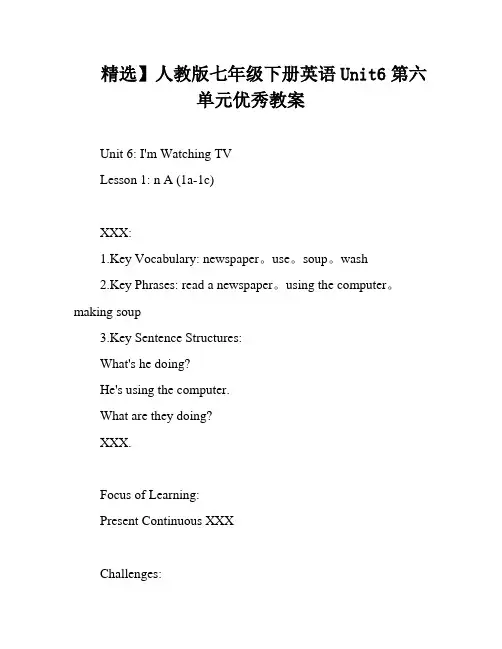
精选】人教版七年级下册英语Unit6第六单元优秀教案Unit 6: I'm Watching TVLesson 1: n A (1a-1c)XXX:1.Key Vocabulary: newspaper。
use。
soup。
wash2.Key Phrases: read a newspaper。
using the computer。
making soup3.Key Sentence Structures:What's he doing?He's using the computer.What are they doing?XXX.Focus of Learning:Present Continuous XXXChallenges:1.n of Present Participle (-ing)2.XXX using Present Continuous XXXIndependent Study:1.Preview the new words on page 31 and memorize them。
Translate the following words from Chinese to English: 报纸 (newspaper)使用 (use)汤 (soup)洗 (wash)2.Preview ns 1a。
1b。
and 1c。
Identify the following phrases and sentence structures:read a newspaperusing the computermaking souptalking on the computerWhat's he doing。
He's using the computer.What are they doing。
They are XXX.Classroom Guidance:Step 1: nXXX some students to perform ns in front of the class。
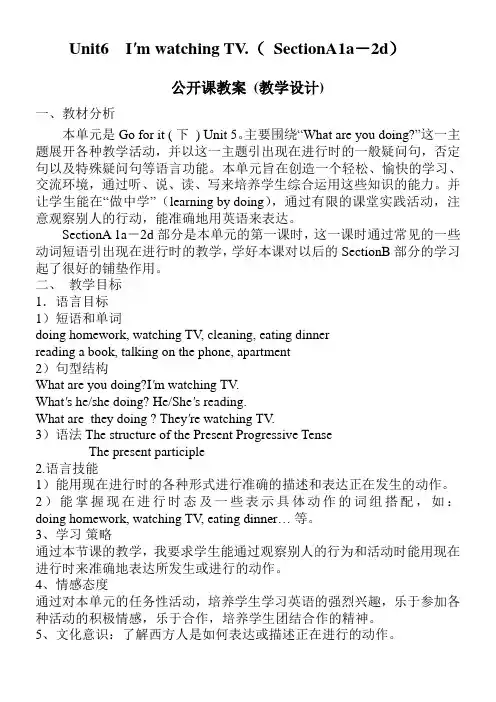
Unit6 I'm watching TV.(SectionA1a-2d)公开课教案(教学设计)一、教材分析本单元是Go for it ( 下 ) Unit 5。
主要围绕“What are you doing?”这一主题展开各种教学活动,并以这一主题引出现在进行时的一般疑问句,否定句以及特殊疑问句等语言功能。
本单元旨在创造一个轻松、愉快的学习、交流环境,通过听、说、读、写来培养学生综合运用这些知识的能力。
并让学生能在“做中学”(learning by doing),通过有限的课堂实践活动,注意观察别人的行动,能准确地用英语来表达。
SectionA 1a-2d部分是本单元的第一课时,这一课时通过常见的一些动词短语引出现在进行时的教学,学好本课对以后的SectionB部分的学习起了很好的铺垫作用。
二、教学目标1.语言目标1)短语和单词doing homework, watching TV, cleaning, eating dinnerreading a book, talking on the phone, apartment2)句型结构What are you doing?I'm watching TV.What's he/she doing? He/She's reading.What are they doing ? They're watching TV.3)语法The structure of the Present Progressive TenseThe present participle2.语言技能1)能用现在进行时的各种形式进行准确的描述和表达正在发生的动作。
2)能掌握现在进行时态及一些表示具体动作的词组搭配,如:doing homework, watching TV, eating dinner…等。
3、学习策略通过本节课的教学,我要求学生能通过观察别人的行为和活动时能用现在进行时来准确地表达所发生或进行的动作。
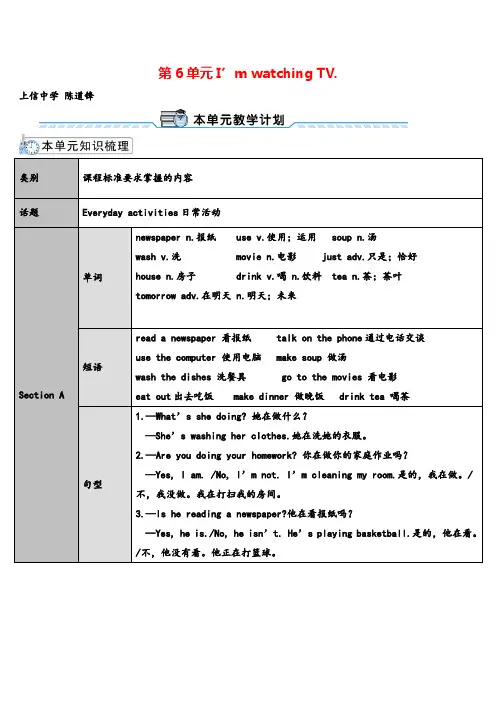
第6单元I’m watching TV. 上信中学陈道锋类别课程标准要求掌握的内容话题Everyday activities日常活动Section A 单词newspaper n.报纸 use v.使用;运用 soup n.汤wash v.洗 movie n.电影 just adv.只是;恰好house n.房子 drink v.喝 n.饮料 tea n.茶;茶叶tomorrow adv.在明天 n.明天;未来短语read a newspaper 看报纸 talk on the phone通过电话交谈use the computer 使用电脑 make soup 做汤wash the dishes 洗餐具 go to the movies 看电影eat out出去吃饭 make dinner 做晚饭 drink tea 喝茶句型1.—What’s she doing? 她在做什么?—She’s washing her clothes.她在洗她的衣服。
2.—Are you doing your homework? 你在做你的家庭作业吗?—Yes, I am. /No, I’m not. I’m cleaning my room.是的,我在做。
/不,我没做。
我在打扫我的房间。
3.—Is he reading a newspaper?他在看报纸吗?—Yes, he is./No, he isn’t. He’s playing basketball.是的,他在看。
/不,他没有看。
他正在打篮球。
Section B单词pool n.游泳池;水池 shop v.购物 n.商店supermarket n.超市man n.男人;人 race n.竞赛study v. & n.学习;研究state n.州 the United States 美国;美利坚合众国any adj.任何的;任一的pron.任何;任一 child n.儿童(pl.children)other adj.另外的;其他的pron.另外的人(或物) wish v.希望oung adj.幼小的;年轻的 miss v.怀念;思念;错过delicious adj.可口的;美味的 still adv. 还;仍然American adj.美国的;美洲的 n.美国人;美洲人host n.主人;东道主 dragon n.龙短语live with sb.和某人一起住 Dragon Boat Festival 端午节make zongzi 包粽子 watch… on TV 在电视上看……the night befoe 前一天夜里 host family寄宿家庭read a story to sb.读故事给某人听 living room 客厅talk show脱口秀 study for为……考试而学习句型1.…, so it’s like any other night for Zhu Hui and his host family.……,所以对朱辉和他的寄家庭来说,今晚和任何一个平常的晚上是一样的。
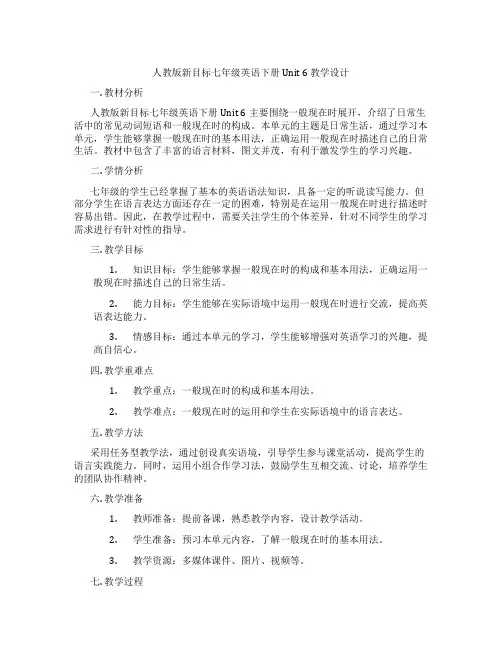
人教版新目标七年级英语下册 Unit 6 教学设计一. 教材分析人教版新目标七年级英语下册Unit 6主要围绕一般现在时展开,介绍了日常生活中的常见动词短语和一般现在时的构成。
本单元的主题是日常生活,通过学习本单元,学生能够掌握一般现在时的基本用法,正确运用一般现在时描述自己的日常生活。
教材中包含了丰富的语言材料,图文并茂,有利于激发学生的学习兴趣。
二. 学情分析七年级的学生已经掌握了基本的英语语法知识,具备一定的听说读写能力。
但部分学生在语言表达方面还存在一定的困难,特别是在运用一般现在时进行描述时容易出错。
因此,在教学过程中,需要关注学生的个体差异,针对不同学生的学习需求进行有针对性的指导。
三. 教学目标1.知识目标:学生能够掌握一般现在时的构成和基本用法,正确运用一般现在时描述自己的日常生活。
2.能力目标:学生能够在实际语境中运用一般现在时进行交流,提高英语表达能力。
3.情感目标:通过本单元的学习,学生能够增强对英语学习的兴趣,提高自信心。
四. 教学重难点1.教学重点:一般现在时的构成和基本用法。
2.教学难点:一般现在时的运用和学生在实际语境中的语言表达。
五. 教学方法采用任务型教学法,通过创设真实语境,引导学生参与课堂活动,提高学生的语言实践能力。
同时,运用小组合作学习法,鼓励学生互相交流、讨论,培养学生的团队协作精神。
六. 教学准备1.教师准备:提前备课,熟悉教学内容,设计教学活动。
2.学生准备:预习本单元内容,了解一般现在时的基本用法。
3.教学资源:多媒体课件、图片、视频等。
七. 教学过程1.导入(5分钟)教师通过展示日常生活场景的图片,引导学生谈论自己的日常生活,为新课的学习营造轻松的氛围。
2.呈现(10分钟)教师通过PPT展示一般现在时的构成和基本用法,让学生初步感知一般现在时的概念。
3.操练(15分钟)教师设计一系列听力、口语活动,让学生在实际语境中运用一般现在时进行表达。
如:听力练习、角色扮演等。
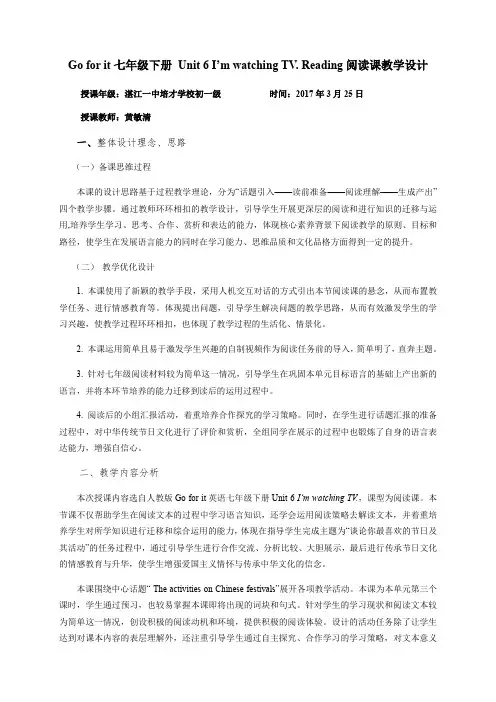
Go for it七年级下册Unit 6 I’m watching TV. Reading阅读课教学设计授课年级:湛江一中培才学校初一级时间:2017年3月25日授课教师:黄敏清一、整体设计理念、思路(一)备课思维过程本课的设计思路基于过程教学理论,分为“话题引入——读前准备——阅读理解——生成产出”四个教学步骤。
通过教师环环相扣的教学设计,引导学生开展更深层的阅读和进行知识的迁移与运用,培养学生学习、思考、合作、赏析和表达的能力,体现核心素养背景下阅读教学的原则、目标和路径,使学生在发展语言能力的同时在学习能力、思维品质和文化品格方面得到一定的提升。
(二)教学优化设计1. 本课使用了新颖的教学手段,采用人机交互对话的方式引出本节阅读课的悬念,从而布置教学任务、进行情感教育等。
体现提出问题,引导学生解决问题的教学思路,从而有效激发学生的学习兴趣,使教学过程环环相扣,也体现了教学过程的生活化、情景化。
2. 本课运用简单且易于激发学生兴趣的自制视频作为阅读任务前的导入,简单明了,直奔主题。
3. 针对七年级阅读材料较为简单这一情况,引导学生在巩固本单元目标语言的基础上产出新的语言,并将本环节培养的能力迁移到读后的运用过程中。
4. 阅读后的小组汇报活动,着重培养合作探究的学习策略。
同时,在学生进行话题汇报的准备过程中,对中华传统节日文化进行了评价和赏析,全组同学在展示的过程中也锻炼了自身的语言表达能力,增强自信心。
二、教学内容分析本次授课内容选自人教版Go for it英语七年级下册Unit 6I’m wa tching TV.,课型为阅读课。
本节课不仅帮助学生在阅读文本的过程中学习语言知识,还学会运用阅读策略去解读文本,并着重培养学生对所学知识进行迁移和综合运用的能力,体现在指导学生完成主题为“谈论你最喜欢的节日及其活动”的任务过程中,通过引导学生进行合作交流、分析比较、大胆展示,最后进行传承节日文化的情感教育与升华,使学生增强爱国主义情怀与传承中华文化的信念。
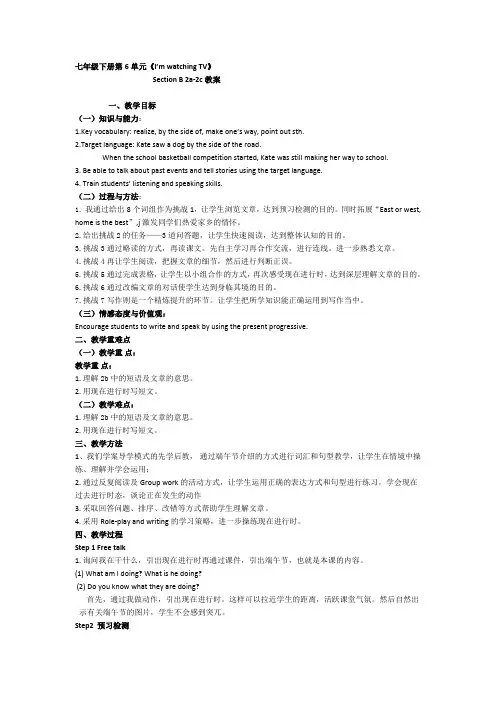
七年级下册第6单元《I’m watching TV》Section B 2a-2c教案一、教学目标(一)知识与能力:1.Key vocabulary: realize, by the side of, make one’s way, point out sth.2.Target language: Kate saw a dog by the side of the road.When the school basketball competition started, Kate was still making her way to school.3. Be able to talk about past events and tell stories using the target language.4. Train students’ listening and speaking skills.(二)过程与方法:1.我通过给出8个词组作为挑战1,让学生浏览文章,达到预习检测的目的。
同时拓展“East or west, home is the best”,j激发同学们热爱家乡的情怀。
2.给出挑战2的任务——3道问答题,让学生快速阅读,达到整体认知的目的。
3.挑战3通过略读的方式,再读课文。
先自主学习再合作交流,进行连线。
进一步熟悉文章。
4.挑战4再让学生阅读,把握文章的细节,然后进行判断正误。
5.挑战5通过完成表格,让学生以小组合作的方式,再次感受现在进行时,达到深层理解文章的目的。
6.挑战6通过改编文章的对话使学生达到身临其境的目的。
7.挑战7写作则是一个精炼提升的环节。
让学生把所学知识能正确运用到写作当中。
(三)情感态度与价值观:Encourage students to write and speak by using the present progressive.二、教学重难点(一)教学重点:教学重点:1. 理解2b中的短语及文章的意思。
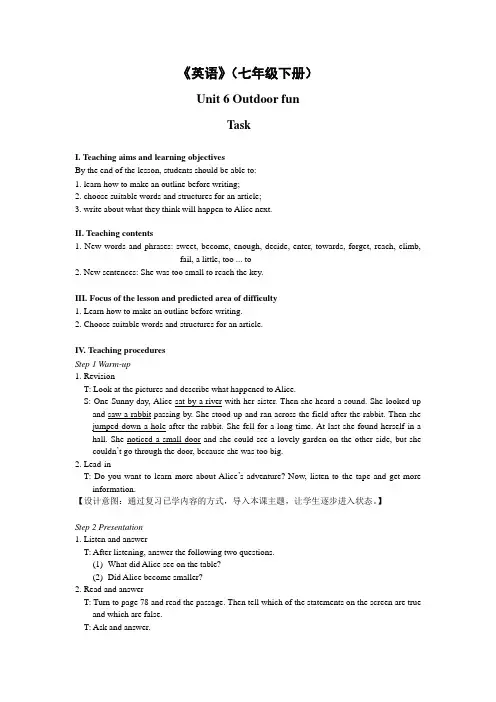
《英语》(七年级下册)Unit 6 Outdoor funTaskI. Teaching aims and learning objectivesBy the end of the lesson, students should be able to:1. learn how to make an outline before writing;2. choose suitable words and structures for an article;3. write about what they think will happen to Alice next.II. Teaching contents1. New words and phrases: sweet, become, enough, decide, enter, towards, forget, reach, climb,fail, a little, too ... to2. New sentences: She was too small to reach the key.III. Focus of the lesson and predicted area of difficulty1. Learn how to make an outline before writing.2. Choose suitable words and structures for an article.IV. Teaching proceduresStep 1 Warm-up1. RevisionT: Look at the pictures and describe what happened to Alice.S: One Sunny day, Alice sat by a river with her sister. Then she heard a sound. She looked up and saw a rabbit passing by. She stood up and ran across the field after the rabbit. Then she jumped down a hole after the rabbit. She fell for a long time. At last she found herself in a hall. She noticed a small door and she could see a lovely garden on the other side, but she couldn’t go through the door, because she was too big.2. Lead-inT: Do you want to learn more about Alice’s adventure? Now, listen to the tape and get more information.【设计意图:通过复习已学内容的方式,导入本课主题,让学生逐步进入状态。
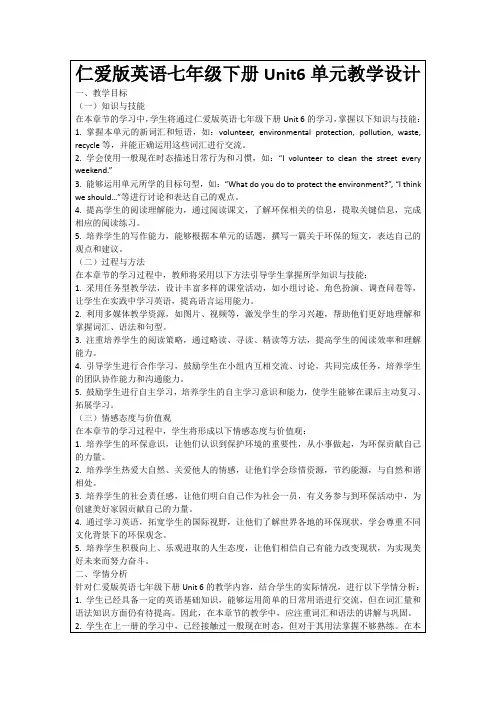
一、单元学习主题
本单元属于“人与自然”主题范畴中“自然生态,环境保护”这一主题群,涉及子主题“世界主要国家的地理位置,不同地区的生态特征与自然景观”。
二、单元内容分析
本单元主要围绕话题“季节”展开听、说、读、写、看等语言活动,分别介绍一年四季的特点以及各个季节的特色活动。
单元内容分析
课时语篇形式主要内容
Lesson31对话
介绍了怪异的天气,以及Jenny、Danny等同
学最喜爱的季节和原因
Lesson32记叙文介绍了加拿大的冬天以及人们从事的活动Lesson33记叙文
介绍了Kim最喜爱的季节——秋天,以及
Kim一家在秋天从事的活动
Lesson34
记叙文、
报告
介绍了Steven最喜爱的季节——春天,以及
在春天从事的活动
Lesson35
记叙文、
博客
介绍了澳大利亚的夏天和人们喜欢的运动
——冲浪
Lesson36电子邮件
讲述了中国的春天以及李明在春天从事的活
动
单元教学目标通过本单元的学习,学生能够:
1.初步感知what引导的感叹句的结构特点,使用感叹句表达惊异、喜悦、气愤等情绪
2.读懂谈论关于季节的对话和文章
3.运用所学语言描述四季的特点以及各个季节的特色活动
4.更加热爱生活,热爱大自然。
Section A第2课时(3a~3c)落红不是无情物,化作春泥更护花。
出自龚自珍的《己亥杂诗·其五》李坑学校李忠华类别学习重点重点单词house, drink, tea, tomorrow重点短语 make dinner, every night重点句式Bob makes dinner every Saturday.课前预习写一写1.房子house2.喝;饮料drink3.茶tea4.明天tomorrow译一译1.做晚饭make dinner2.每天晚上every night 背一背鲍勃每个星期六做晚饭。
Bob makes dinner every Saturday.新课导入Teacher shows some pictures. Teacher: What’s Li Na doing? Students: She is playing tennis. Teacher: What’s Jay Chou doing? Students: He is singing.新【完成教材Grammar Focus的教学任务】课展示新课展示完成语法归纳及练习。
【完成教材3a~3c的教学任务】1.根据例句写句子,让学生把答案写到黑板上,师生集体核对答案。
教师引导学生总结一般现在时态和现在进行时态的区别。
2.让学生将句子按顺序排列,组成一个电话对话,然后两人一组练习对话。
3.小组一名成员做动作,其他同学猜这位同学正在做什么动作。
练习现在进行时态的一般疑问句及简略回答。
【语法提要】drinkdrink作及物动词,意为“喝”。
drink tea意为“喝茶”。
例句:Would you like to drink a cup of milk?你想要喝一杯牛奶吗?拓展:drink还可以作名词,意为“饮料”,一般情况下为不可数名词,当指饮料的种类或份数时为可数名词。
例句:There are all kinds of drinks in the shop.这个商店有各种各样的饮料。
Unit 6 Task名师教案I. Teaching aims and learning objectivesBy the end of the lesson, students should be able to:1. learn how to make an outline before writing;2. choose suitable words and structures for an article;3. write about what they think will happen to Alice next.II. Teaching contents1. New words and phrases: sweet, become, enough, decide, enter, towards, forget,reach, climb, fail, a little, too ... to2. New sentences: She was too small to reach the key.III. Focus of the lesson and predicted area of difficulty1. Learn how to make an outline before writing.2. Choose suitable words and structures for an article.IV. Teaching proceduresStep 1 Warm-up1. RevisionT: Look at the pictures and describe what happened to Alice.S: One Sunny day, Alice sat by a river with her sister. Then she heard a sound. She looked up and saw a rabbit passing by. She stood up and ran across the field after the rabbit. Then she jumped down a hole after the rabbit. She fell for a long time.At last she found herself in a hall. She noticed a small door and she could see a lovely garden on the other side, but she couldn’t go through the door, because she was too big.2. Lead-inT: Do you want to learn more about Alice’s adventure? Now, listen to the tape and get more information.【设计意图:通过复习已学内容的方式,导入本课主题,让学生逐步进入状态。
Unit 6 I'm watching TV. (第一课时Section A 1a—1c)【学习目标】1.学习使用1a中的动词短语;2.学习现在进行时态;3.学会运用常用的动词短语,谈论人们正在做什么。
【重、难点】1.交际中现在进行时的正确运用; 2.动词短语的运用。
一.回顾已知,导入新课1.看电视_______________2.清洗餐具__________________3.听音乐_________________4.他们来自哪里?__________________________5.你为什么喜欢猴子?_________________二.自主学习,边学边导学习任务一:1.学习并熟练掌握本节课的新词汇,写出下列中文意思。
newspaper read a newspaper use soup make soup wash2.认真观察1a中的图片,将活动与图片搭配,小组讨论并核对答案。
3.听录音,完成1b,小组讨论核对答案.学习任务二:询问他人正在做什么,引出现在进行时态,总结现在进行时态的构成be动词(am/is/are)+ doing学习任务三:看图片1a,熟练练习、掌握询问他人正在做什么的句型:What’s he/she doing?和What’re you/they doing?三.精讲点拨,精练提升现在进行时表示正在进行的动作或存在的状态。
一般有be动词(am, is, are)加上动词的现在分词(即动词的ing形式)构成。
通常句子中常有now, Look! Listen! It’s two o’clock now.等表示正在进行的时间状语。
1.My brother is watching TV. (对划线部分提问)________ your brother ________?2. Tom and I ___ music now.A. are listeningB. are listening toC. listening3. Are they having lunch at home now? (用every day 替换now)_______they ________lunch at home every day?4. They’re playing basketball. (划线提问)_______are they _________?四.达标检测,当堂过关(一)单选选择( )1. Look,! They _______ games over there.A. is playB. is playingC. are playing( )2. We are doing ___________________.A. our homeworkB. my homeworkC. one’s homework( )3. Jim and his teacher ____________ over there.A. is talkB.is talkingC. are talking( )4. Lily __________ the blackboard.A. is lookingB. is looking atC. looking( )5. They are _________ books. A. seeing B. reading C. watching ( )6. _________ are the students doing in the classroom now?A. WhatB. WhereC. When( )7.---- Is the boy using the computer? ---_________A. Yes, he doesB. No, he isn’tC. No, he doesn’t( )8.----What ____ your family doing? ----They’re watching TV.A. isB. doesC. are( )9.Your idea __________ good.A. listensB. soundC. sounds( ) 10. It’s twelve o’clock now. The Greens _______lunch at home.A. haveB. is havingC. are having(二)读短文,回答问题。